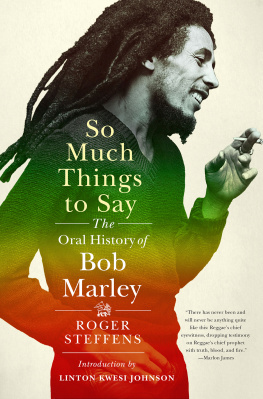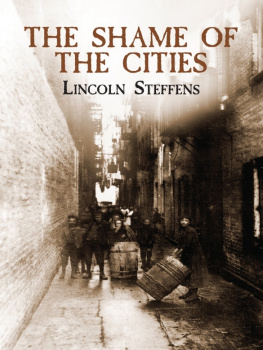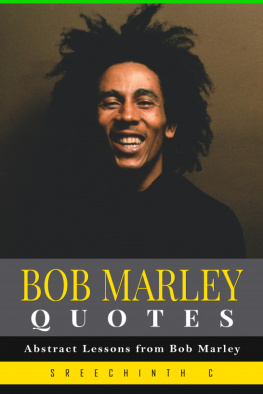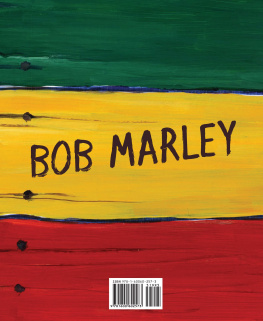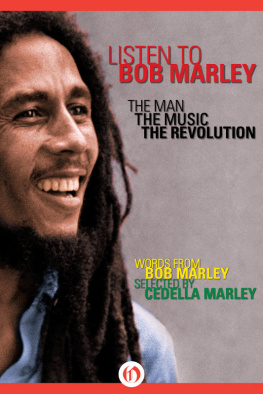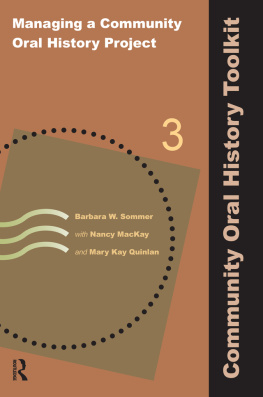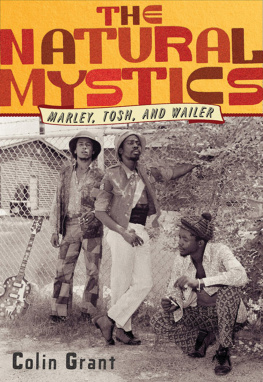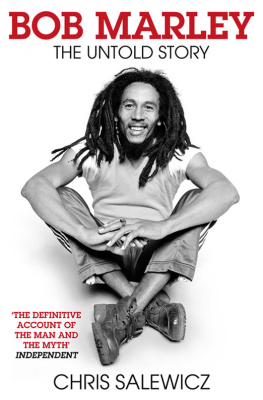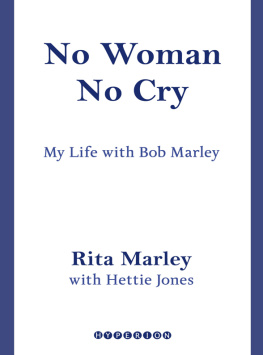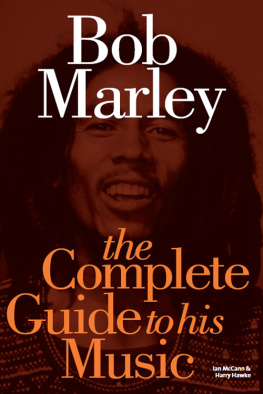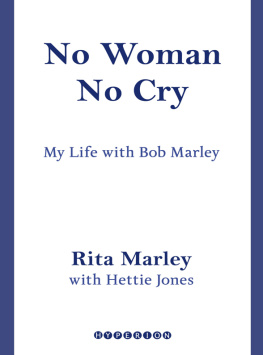Roger Steffens - So Much Things to Say: The Oral History of Bob Marley
Here you can read online Roger Steffens - So Much Things to Say: The Oral History of Bob Marley full text of the book (entire story) in english for free. Download pdf and epub, get meaning, cover and reviews about this ebook. year: 2017, publisher: W. W. Norton & Company, genre: Detective and thriller. Description of the work, (preface) as well as reviews are available. Best literature library LitArk.com created for fans of good reading and offers a wide selection of genres:
Romance novel
Science fiction
Adventure
Detective
Science
History
Home and family
Prose
Art
Politics
Computer
Non-fiction
Religion
Business
Children
Humor
Choose a favorite category and find really read worthwhile books. Enjoy immersion in the world of imagination, feel the emotions of the characters or learn something new for yourself, make an fascinating discovery.
- Book:So Much Things to Say: The Oral History of Bob Marley
- Author:
- Publisher:W. W. Norton & Company
- Genre:
- Year:2017
- Rating:4 / 5
- Favourites:Add to favourites
- Your mark:
- 80
- 1
- 2
- 3
- 4
- 5
So Much Things to Say: The Oral History of Bob Marley: summary, description and annotation
We offer to read an annotation, description, summary or preface (depends on what the author of the book "So Much Things to Say: The Oral History of Bob Marley" wrote himself). If you haven't found the necessary information about the book — write in the comments, we will try to find it.
So Much Things to Say: The Oral History of Bob Marley — read online for free the complete book (whole text) full work
Below is the text of the book, divided by pages. System saving the place of the last page read, allows you to conveniently read the book "So Much Things to Say: The Oral History of Bob Marley" online for free, without having to search again every time where you left off. Put a bookmark, and you can go to the page where you finished reading at any time.
Font size:
Interval:
Bookmark:

R OGER STEFFENS: Cedella Malcolm Marley Booker, Bob Marleys mother, was eighteen at the time of his birth. Her white husband, born in Clarendon, Jamaica, was named Norval Marley. He was around sixty-four when Nesta Robert Marley was born on February 6, 1945, in a tiny rural village called Nine Mile, which had no electricity or running water. Christopher Marley, a member of the white Marley family, has spent years tracing Bobs bloodline and has been sharing his research with me as new discoveries come to light, debunking many of the false claims that continue to this day, including the idea that Norval was born in England and was an army officer.
CHRISTOPHER MARLEY: Bobs father was Norval Sinclair Marley, born to a British father and a colored mother. Norval was not a sea captain, nor was he a quartermaster or captain or officer in the British Army. He was a ferro-cement engineer. His British Army discharge papers show that he worked in various labour corps in the UK during the First World War and was discharged as a private. He did not see active service on the battlefield. Norval Marleys family was not Syrian, as has been suggested. He was a restless, wandering man. He traveled and worked all over the world at a time when travel was not the simple thing it is todayto Cuba, the UK, Nigeria and South Africa.
He was supervising the subdivision of some rural land in Saint Ann Parish for war veteran housing when he married eighteen-year-old Cedella Malcolm, whom he had got pregnant. He provided little financial support and seldom saw her and their son. He died of a heart attack in 1955, stone broke and living off an eight-shilling-a-week army pension (about US$1.20).
Norval was seriously unstable, to put it mildly. The rejection of Bob by the Marley family was a rejection of Norval.
CEDELLA BOOKER: Norval was living in Nine Mile at the time, watching the lands that the government gave peoplecertain amount of land to work on during the war. He was like an overseer.
ROGER STEFFENS: If there was any true direction in Bobs earliest years, it would come from his grandfather Omariah, who was known locally as a myalmana benevolent practitioner of healing artsas opposed to an obeahman, whose darker intentions cast fear into the hearts of superstitious country folk. Omariah was reported to have fathered as many as thirty children.
CEDELLA BOOKER: My father Omariah was a very spiritual person, hes like the Blackheart Man [a practitioner of traditional healing methods]. Hes a man like, when people sick he can help them and give them medicine and things like that. He had his own medicine that him fix and mix, and just cure people. Omariah taught Bob not to steal, to tell the truth, to obey. He owned enough land, here there and everywhere. Not no big great properties, but good parcels, like thirty acres, twenty acres, ten acres, five acres all over the place. Bob moved donkeys, goats, carry food from up in the field to the home. Then him ride the donkey and pick up corn, cut corn bush to go feed the other animals. Them have to do manual work. We have to go to spring to get water.
ROGER STEFFENS: Bobs cousin Sledger, who was raised alongside him in Nine Mile, recalls that Bob was a fearless rider of his favorite donkey, Nimble, and could jump bareback over a five-foot wall with ease, sometimes even doing it backward! He and Sledger loved music and would listen especially on Sundays, when Omariah would plug his radio into a generator and play it for the locals, tuning in to a Miami station. Elvis Presley, Fats Domino and Ricky Nelson were early favorites of the boys. Bobs nascent musical instruction came directly from Cedellas dad.

Bob Marleys mother, Cedella Booker, atop Mount Wilson above Los Angeles on Mothers Day, May 1988.
CEDELLA BOOKER: My father played organ, guitar, a little violin. Everyone in the family played music. My cousin Marcenine, he make a little banjo guitar and they put the string on it. That would be Bobs first instrument. And when he got bigger he would start holding guitar. Sometimes he hum along with me on songs like Precious Lord Take My Hand.
ROGER STEFFENS: At the age of three, Bob began to evince intuitive powers of surprising accuracy.
CEDELLA BOOKER: I remember when a woman we called Aunt Zen used to love to play with Bob as a little boy. So she came to the shop where I worked and he start to read her hand and tell her some things. And she said, Everything that the child tell me is right.
Another man, Solomon Black, a district constable, he came to the shop and stopped by and as a little boy, Bob take his hand and start to look at it, start to tell him some things. And whatever he told him, the man say, You might be taking it for a joke, but everything the child tell me is right.
Bob knew he wasnt going to be here for long, so he have to do what he have to do. I have this friend, Ibis Pitts. He was Bobs first friend that he made in Delaware in 1966. Ibis said that one day he and his friend Dion Wilson went over to the park where I used to live and Bob climbed into a tree and that Bob said, When I am thirty-six I am going to die. This was in 1969.
ROGER STEFFENS: Cedella Booker, affectionately known as Mother B, has visited my Reggae Archives several times over the years. Many of our conversations went unrecorded, although I made notes of each one afterward. In one she recalled Norval showing up at Nine Mile when Bob was five, asking that she allow Bob to come with him to Kingston so he could educate him and give him a shot at a better life. Cedella agreed, but when Norval and Bob arrived in Kingstonone of the only times they were togetherinstead of taking him home and enrolling him in school, Norval sent him to live with an elderly woman friend of his named Miss Gray. During the next couple of years Bob was essentially an abandoned child on the streets of Kingston. Cedella would write Norval and ask when she could visit, but he discouraged her every attempt and told her the boy was in a boarding school in St. Thomas. Eventually someone from Nine Mile recognized Bob on a Kingston street and told Cedella where he was and she came and got him.
CEDELLA BOOKER: Bob was about five when he went to Kingston, not quite two years when he came back, and Mrs. Simpson asked him to read her hand and he said, No Im not reading no more hand, Im singing now.
ROGER STEFFENS: Neville OReilly Livingston, later to be known as Bunny Wailer, cofounded the Wailers. He first met Bob when they were both youngsters.
BUNNY WAILER: I was about nine [in 1957] when my father took me up to live in Nine Mile, where I first met Bob. We moved, migrated. My father bought some land there, about twenty-five acres, built a house, built a shop. We stayed there about nine, ten months. I didnt live there too long though. The place was too cold. Very cold area. I wasnt prepared for that kind of cold. I used to get cramps in my stomach, so they had to ship me back to the city. And then, a short time after that, Bob came to the city to live with his mother.
ROGER STEFFENS: As a youngster, Bob would explore the area around Nine Mile, and sometimes went places he was forbidden to go. During one of these excursions he cut open his right foot after stepping on a broken glass bottle. He was afraid to show the wound to his mother for fear of being punished. But it became infected and he was in great pain for months. Eventually his cousin Nathan made a plaster of warm orange pulp and a yellow powder called iodoform, and within a couple of weeks the wound completely healed. This was the first of numerous wounds to the foot in which his fatal cancer would eventually take hold.
Next pageFont size:
Interval:
Bookmark:
Similar books «So Much Things to Say: The Oral History of Bob Marley»
Look at similar books to So Much Things to Say: The Oral History of Bob Marley. We have selected literature similar in name and meaning in the hope of providing readers with more options to find new, interesting, not yet read works.
Discussion, reviews of the book So Much Things to Say: The Oral History of Bob Marley and just readers' own opinions. Leave your comments, write what you think about the work, its meaning or the main characters. Specify what exactly you liked and what you didn't like, and why you think so.

